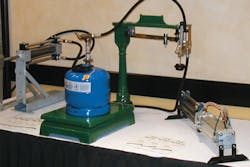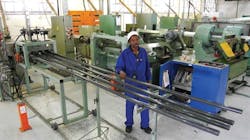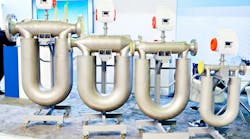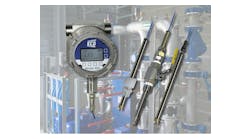The first “Gas-in-a-Box” system that allows users to fill small liquefied petroleum gas (LPG) cylinders was deployed several months ago in Cape Town, South Africa. The system was developed to fulfill a need for safe gas filling in rural and informal settlements in Southern Africa, said system provider Gas Piping Services (GPS) Director AJ de Wet.
Most rural and informal settlements in Southern Africa are still dependent on wood and coal, and this has resulted in household air pollution and several health problems including chronic obstructive pulmonary disease (COPD), asthma, lung cancer, pneumonia and other respiratory problems, particularly among women and children. These issues resulted in high demand for LPG as a solution for reducing household pollution.
Creating opportunity
At the first installation site in Cape Town, the public was filling small gas cylinders from a large upside-down cylinder, which resulted in accidents and cylinder under-filling. The gas-in-a-box system was installed to eliminate these problems.
“The low noise was a pleasant surprise,” said the manager of a Gas Mart franchise, who uses the system as his only pump during the South African winter months.
GPS created a business opportunity for small and microenterprises by offering them secure gas filling sites that can be locked every night with distribution of gas cylinders from the gas suppliers to the small businesses.
A business plan was made available to these entrepreneurs, allowing them to gain funding from financial institutions and the gas supplier, which wished to enter the rural and informal sector.
Gas-in-a Box ventures are designed to support job creation and new business opportunities. The gas supplier can enter into rental agreements with new small businesses or international funding organizations.
GPS aims to grow the LPG distribution market by designing the system with reliable filling equipment in a cost-effective filling containment. De Wet worked with Mevaco Pumps on the pumps included in the system.
It is a natural progression to use the same quality pumps in the LPG industry, said De Wet, noting that some modifications were required to ensure small LPG cylinders could be filled quickly and that the system was durable under harsh conditions.
The pump was able to supply higher delivery volumes and the low noise was well-received in congested commercial areas close to housing, said De Wet. The 220-volt motor proved ideal for these areas, and the gearbox runs smooth with no heat generated by the gearbox, motor or pump.
Important features of the pumps are the piston-rod bushings and piston discs, made out of low-friction materials for long life, which have high dimensional stability, flexibility, cost-effectiveness and the ability to withstand temperature changes.
Three models are available:
- A hand filling plant with a hand pump capable of filling small LP gas cylinder in two and a half minutes
- An electrical filling machine with an electric-driven filling pump with the capacity to fill a 9-kilogram (kg) LPG cylinder in less than three minutes.
- An electronic filling machine with an electric-driven filling pump with the capacity to fill a 9 kg LPG cylinder in less than three minutes, but with extra pump controls to prevent over- or underfilling of gas cylinders.
The system’s patented design provides the small dealer a one-man operation that offers protection from the weather during filling and has all the safety features of a large filling site with no combustible material used during construction. It includes:
- A lockable steel gas box with ventilation to prevent accumulation of gas
- A nonslip working area with storage space for the 4 by 48 kg cylinders inside the box when locked
- A reliable, quiet hand or electrical pump requiring no maintenance
- A basic or advanced cylinder scale up to 9 kg capacity
- A liquid manifold for up to 4 by 48 kg cylinders
- Liquid hoses to and from the LPG pumps with quick-acting valves
- An optional solar panel with light and cell phone charger
- Custom color coding and business signage
- Safety signs
The system was specifically sized to be the same as a pallet with forklift slots below to allow distributors to transport them in manageable loads and large quantities.
Butane pump compatibility
Vesconite Bearings makes solid rods, machined plates and bushings as standard parts as well as high-quality finished parts for pumps and the agriculture, railways, mining, heavy transport, hydro, wind turbine, earthmoving and marine industries.
Michael Matoba of Vesconite Bearings extruding 3-millimeter Vesconite bars used in diverse applications globally. Image courtesy of Vesconite Bearings
The Gas-in-a-Box system’s pumps are fitted with pistonrod bushings and composite piston discs designed to be successful in butane pumps because of the following qualities:
- Durability — Long-wear life is superior to other materials, including nylon and bronze.
- Low wear on metal parts even when dry running — They are made from self-lubricating materials to run dry for short periods.
- Smaller clearances — Alternative products generally require large clearances because of temperature changes that can occur when the gas changes phase as a result of disconnecting hoses. The system’s material can operate with small clearances.
- Temperature range — Pump components must be able to withstand the typical liquid and gas temperatures of butane or propane. At atmospheric pressure, butane boils at approximately -1°C (30°F). This material is suited to temperatures ranging from -60°C (-76°F) to 65°C (150°F) and will not degrade or become brittle at this gas’ boiling point or at its typical liquid-phase temperature.
A growing LPG market
Demand for LPG is increasing as a result of an unreliable electricity supply in the subregion. The South African electricity parastatal has experienced electricity supply constraints because of aging power stations. It had limited additional electricity capacity coming on stream.
This has resulted in the LPG market experiencing unprecedented growth over the last five years as consumers turn to gas as an alternative to electricity. DeWet said that because South African refineries could not sustain the demand, the gas industry went into overdrive and started building a coastal storage capacity.
Several organizations had to source gas and gas filling equipment, while the current supplier could not sustain the growth, and cheaper imported equipment disappointed the local market.
These conditions led to many people seeing an opportunity to fill gas cylinders, even with unsafe filling equipment. The system has the opportunity to provide a safe solution to the cylinder filling.
Two of the three available system models have been sold in South Africa and neighboring countries, said DeWet. His company plans to offer national and international service and distribution via its gas suppliers network, backed by the Gas Technician Network.
AJ de Wet is a director at Gas Piping Services. He has previously been the training manager at the LPGas Association, a project manager at Puregas and a project engineer at Fedgas. For more information on Gas Piping Services, visit gasps.co.za. For more information on Mevaco pumps used in Gas-in-a-Box systems, visit mevaco.gr. For more on the Vesconite Bearings piston-rod bushings fitted in the system pumps, visit vesconite.com.



